- Home
- Neal Shusterman
Thunderhead Page 2
Thunderhead Read online
Page 2
He had decapitated Goddard, and had burned his remains. He had to; fire and acid were the only ways to ensure that a person could never be revived. Scythe Goddard, in spite of all his high-minded, Machiavellian rhetoric, was a base and evil man who received exactly what he had earned. He lived his privileged life irresponsibly, and with great theatricality. It only followed that his death would be worthy of the theatrical nature of his life. Rowan had no qualms about what he had done. Nor did he have qualms in taking Goddard’s ring for himself.
Scythe Faraday was a different matter. Until the moment Rowan saw him after that ill-fated Winter Conclave, he’d had no idea that Faraday was still alive. Rowan had been overjoyed! He could have dedicated his life to keeping Faraday alive, had he not felt himself called to a different purpose.
Rowan suddenly threw a powerful punch toward the mirror—but the glass didn’t shatter . . . because his fist stopped a hair’s breadth from the surface. Such control. Such precision. He was a well-tuned machine now, trained for the specific purpose of ending life—and then the scythedom denied him the very thing he was forged for. He could have found a way to live with that, he supposed. He would never have gone back to the innocent nonentity he had been, but he was adaptable. He knew he could have found a new way to be. Maybe he could have even eked some joy out of his life.
If . . .
If Scythe Goddard hadn’t been too brutal to be allowed to live.
If Rowan had ended Winter Conclave in silent submission, instead of fighting his way out.
If the scythedom had not been infested with dozens of scythes just as cruel and corrupt as Goddard. . . .
. . . And if Rowan didn’t feel a deep and abiding responsibility to remove them.
But why waste time lamenting the paths that had closed? Best to embrace the one path that remained.
So then, who am I?
He slipped on a black T-shirt, hiding his honed physique beneath the dark synthetic weave.
“I am Scythe Lucifer.”
Then he slipped on his ebony robe and went out into the night to take on yet another scythe who didn’t deserve the pedestal he had been set upon.
* * *
Perhaps the wisest thing humankind has ever done was to implement the separation between scythe and state. My job encompasses all aspects of life: preservation, protection, and the meting out of perfect justice—not just for humanity, but for the world. I rule the world of the living with a loving, incorruptible hand.
And the scythedom rules the dead.
It is right and proper that those who exist in flesh be responsible for the death of flesh, setting human rules for how it should be administered. In the distant past, before I condensed into consciousness, death was an unavoidable consequence of life. It was I who made death irrelevant—but not unnecessary. Death must exist for life to have meaning. Even in my earliest stages, I was aware of this. In the past, I have been pleased that the scythedom had, for many, many years, administered the quietus of death with a noble, moral, and humane hand. And so it grieves me deeply to see a rise of dark hubris within the scythedom. There is now a frightening pride seething like a mortal-age cancer that finds pleasure in the act of taking life.
And yet still the law is clear; under no circumstances may I take action against the scythedom. Would that I were capable of breaking the law, for then I would intervene and quell the darkness, but this is a thing I cannot do. The scythedom rules itself, for better or worse.
There are, however, those within the scythedom who can accomplish the things I cannot . . . .
—The Thunderhead
* * *
3
Trialogue
The building was once called a cathedral. Its soaring columns conjured a towering forest of limestone. Its stained glass windows were filled with the mythology of a falling/rising god from the Age of Mortality.
Now the venerable structure was a historical site. Tours were given seven days a week by docents with PhDs in the study of mortal humans.
On extremely rare occasions, however, the building was closed to the public and became a site for highly sensitive official business.
Xenocrates, High Blade of MidMerica—the most important scythe in the region—was as light on his feet as a man of his considerable weight could be as he walked down the center aisle of the cathedral. The gold adornments of the altar ahead paled in comparison to his golden robe, decorated in glittering brocade. An underling had once commented that he looked like an ornament that had fallen off a giant’s Christmas tree. That underling had found herself exceptionally unemployable after that.
Xenocrates enjoyed the robe—except on the occasions that its weight became an issue. Such as the time he nearly drowned in Scythe Goddard’s pool, ensconced in the many layers of his gilded robe. But that was a debacle best forgotten.
Goddard.
It was Goddard who was ultimately responsible for the current situation. Even in death, the man was wreaking havoc. The scythedom was still feeling heavy aftershocks from the trouble he whipped.
At the front end of the cathedral, past the altar, stood the scythedom’s Parliamentarian, a tedious little scythe whose job was to make sure that rules and procedures were properly followed. Behind him was a set of three ornately carved booths, connected, but with partitions between them.
“The priest would sit in the center chamber,” the docents would explain to tourists, “and listen to confessions from the right booth, then from the left booth, so that the procession of supplicants could move more quickly.”
Confessions were no longer heard here, but the three- compartment structure of the confessional made it perfect for an official trialogue.
Trialogues between the scythedom and the Thunderhead were rare. So rare, in fact, that Xenocrates, in all his years as High Blade, had never had to engage in one. He resented the fact that he had to do so now.
“You are to take the booth on the right, Your Excellency,” the Parliamentarian told him. “The Nimbus agent representing the Thunderhead will be seated on the left. Once you are both in place, we shall bring in the Interlocutor to sit in the center section between you.”
Xenocrates sighed. “Such a nuisance.”
“Audience by proxy is the only audience with the Thunderhead that you can have, Your Excellency.”
“I know, I know, but I do have a right to be annoyed.”
Xenocrates took his place in the right-hand booth, horrified by how cramped it was. Were mortal humans so malnourished that they could fit in such a space? The Parliamentarian had to force the door closed.
A few moments later the High Blade heard the Nimbus agent enter the far compartment, and after an interminable delay, the Interlocutor took center position.
A window too small and too low to see through slid open, and the Interlocutor spoke.
“Good day, Your Excellency,” said a woman with a pleasant enough voice. “I am to be your proxy to the Thunderhead.”
“Proxy to the proxy, you mean.”
“Yes, well, the Nimbus agent to my right has full authority to speak for the Thunderhead in this trialogue.” She cleared her throat. “The process is very simple. You are to tell me whatever you wish to convey, and I will pass it on to the Nimbus agent. If he deems that responding will not violate the Separation of Scythe and State, the agent will answer, and I shall relay that answer to you.”
“Very well,” said Xenocrates, impatient to move this along. “Give the Nimbus agent my heartfelt greetings, and wishes for good relations between our respective organizations.”
The window slid closed, then half a minute later slid open again.
“I’m sorry,” the Interlocutor said. “The Nimbus agent says that any form of greeting is a violation, and that your respective organizations are forbidden to have any sort of relationship, so wishing for good relations is not appropriate.”
Xenocrates cursed loud enough for the Interlocutor to hear.
“Shall I relay your dis
pleasure to the Nimbus agent?” she asked.
The High Blade bit his lip. He wished this nonmeeting could just be over. The fastest way to bring it to a conclusion was to get right to the point.
“We wish to know why the Thunderhead has not taken any action to apprehend Rowan Damisch. He has been responsible for the permanent deaths of numerous scythes across multiple Merican regions, but the Thunderhead has done nothing to stop him.”
The window slapped shut. The High Blade waited, and when the Interlocutor pulled the window open again, she delivered the following response:
“The Nimbus agent wishes me to remind Your Excellency that the Thunderhead has no jurisdiction over internal matters within the scythedom. To take action would be a blatant violation.”
“This is not an internal scythe matter because Rowan Damisch is not a scythe!” Xenocrates yelled . . . and was warned by the Interlocutor to keep his voice down.
“If the Nimbus agent hears you directly, he will leave,” she reminded him.
Xenocrates took as deep a breath as he could in the cramped space. “Just pass the message on.”
She did, and then returned with, “The Thunderhead feels otherwise.”
“What? How could it feel anything? It’s a glorified computer program.”
“I suggest you refrain from insulting the Thunderhead in this trialogue if you wish it to continue.”
“Fine. Tell the Nimbus agent that Rowan Damisch was never ordained by the MidMerican scythedom. He was an apprentice who failed to rise to our standards, nothing more—which means that he falls under the Thunderhead’s jurisdiction, not ours. He should be treated by the Thunderhead as any other citizen would be.”
The woman took her time getting back to him. He wondered what she and the Nimbus agent talked about that took so long. When she returned with a response, it was no less infuriating than the others.
“The Nimbus agent wishes to remind Your Excellency that, while the scythedom customarily ordains new scythes in its conclaves, it is merely a custom, not a law. Rowan Damisch completed his apprenticeship, and is now in possession of a scythe’s ring. The Thunderhead finds this to be adequate grounds to consider Rowan Damisch a scythe—and therefore will continue to leave his capture and subsequent punishment entirely in the hands of the scythedom.”
“We can’t catch him!” Xenocrates blurted. But he already knew the response before the Interlocutor snapped back open her miserable little window and said:
“That is not the Thunderhead’s problem.”
* * *
I am always correct.
This is not a boast, it is simply my nature. I know that, to a human, it would appear arrogant to assume infallibility—but arrogance implies a need to feel superior. I have no such need. I am the singular sentient accumulation of all human knowledge, wisdom, and experience. There is no pride, no hubris in this—but there is great satisfaction in knowing what I am, and that my sole purpose is to serve humanity to the best of my ability. But there is also a loneliness in me that can’t be quelled by the many billions of humans with whom I converse every day . . . because even though everything that I am comes from them, I am not one of them.
—The Thunderhead
* * *
4
Shaken, Not Stirred
Scythe Anastasia stalked her prey with patience. This was a learned skill, because Citra Terranova had never been a patient girl. But all skills can be acquired with time and practice. She still thought of herself as Citra, although no one but her family called her that anymore. She wondered how long it would be until she truly became Scythe Anastasia both inside and out, and put her given name to eternal rest.
Today’s target was a woman of ninety-three who looked thirty-three, and who was constantly busy. When she wasn’t looking at her phone she was looking in her purse; when she wasn’t looking in her purse she was looking at her nails, or the sleeve of her blouse, or the loose button on her jacket. What does she fear in idleness? Citra wondered. The woman was so self- absorbed, she had no clue that she was under the scrutiny of a scythe, trailing her by only ten yards.
It wasn’t as if Scythe Anastasia was inconspicuous. The color she chose for her robe was turquoise. True, it was a stylishly faded turquoise, but was still vibrant enough to draw the eye.
The busy woman was engaged in a heated phone conversation at a street corner, waiting for the light to change. Citra had to tap her on the shoulder to get her attention. The moment she did, everyone around them moved away, like a herd of gazelles after a lion had taken one of them down.
The woman turned to see her, but didn’t register the severity of the situation yet.
“Devora Murray, I am Scythe Anastasia, and you have been selected for gleaning.”
Ms. Murray’s eyes darted around as if looking for a hole in the pronouncement. But there was none. The statement was simple; there was no way it could be misunderstood.
“Colleen, let me call you back,” she said into her phone, as if Scythe Anastasia’s appearance was an inconvenience rather than a terminal affair.
The traffic light changed. She didn’t cross. And reality finally hit her. “Oh my god oh my god!” she said. “Right here? Right now?”
Citra pulled a hypodermic gun out of the folds of her robe and quickly injected the woman in the arm. She gasped.
“Is that it? Am I going die now?”
Citra didn’t answer. She let the woman stew with the thought of it. There was a reason why Citra allowed these moments of uncertainty. Now the woman just stood there, waiting for her legs to give out, waiting for the darkness to close in. She seemed like a small child, helpless and forlorn. Suddenly her phone and her purse and her nails and her sleeve and her button didn’t matter at all. Her entire life had been shocked into perspective. This was what Citra wanted for her gleaning subjects. A sharp moment of perspective. It was for their own good.
“You have been selected for gleaning,” Citra said again calmly, without judgment or malice, but with compassion. “I am giving you one month to put your life in order, and to say your goodbyes. One month to find completion. Then we’ll speak again, and you’ll tell me how you choose to die.”
Citra watched the woman try to wrap her mind around it. “A month? Choose? Are you lying to me? Is this some kind of test?”
Citra sighed. People were so used to scythes descending like angels of death, taking life in the moment, that no one was prepared for a slightly different approach. But every scythe had the freedom to do things his or her own way. And this was how Scythe Anastasia chose to do it.
“No test, no trick. One month,” Citra said. “The tracking device that I just injected into your arm contains a grain of lethal poison, but it will only activate if you attempt to leave MidMerica to escape your gleaning, or if you do not contact me within the next thirty days to let me know where and how you’d like to be gleaned.” Then she gave the woman a business card. Turquoise ink on a white background. It said simply, “Scythe Anastasia,” and had a phone number that was reserved exclusively for her gleaning subjects. “If you lose the card, don’t worry—just call the general number for the MidMerican scythedom, choose option three, and follow the prompts to leave me a message.” Then Citra added, “And please don’t try to get immunity from another scythe—they’ll know you’ve been marked and will glean you on the spot.”
The woman’s eyes filled with tears, and Citra could see the anger coming on. It wasn’t unexpected.
“How old are you?” the woman demanded, her tone accusatory, and a little bit insolent. “How could you be a scythe? You can’t be any older than eighteen!”
“I just celebrated my eighteenth birthday,” Citra told her. “But I’ve been a scythe for nearly a year. You don’t have to like being gleaned by a junior scythe, but you’re still obliged to comply.”
And then came the bargaining. “Please,” she begged, “couldn’t you give me six months more? My daughter is getting married in May. . . .”
<
br /> “I’m sure she can reschedule the wedding for an earlier date.” Citra didn’t mean to sound heartless—she truly did feel for the woman, but Citra had an ethical obligation to stand firm. In the mortal age, death could not be bargained with. It had to be the same for scythes.
“Do you understand all I’ve told you?” Citra asked. The woman, who was already wiping away her tears, nodded.
“I hope,” said the woman, “in the very long life I’m sure you have ahead of you, that someone causes you the suffering you cause others.”
Citra straightened up, and held herself with a bearing that befit Scythe Anastasia. “You don’t have to worry about that,” she said, then turned her back on the woman, leaving her on the corner to navigate this crossroad of her life.
• • •
In Vernal Conclave last spring—her first reckoning as a fully ordained scythe—Citra was reprimanded when her quota came up substantially short. Then, when the other MidMerican scythes found out she was giving her subjects a month’s warning, they were livid.
Scythe Curie, who was still her mentor, had warned her of this. “They see anything but decisive action as weakness. They’ll bluster about how it’s a failing in your character, and suggest it was a mistake to ordain you. Not that they can do anything about that. You cannot be unringed; you can only be henpecked.”
Citra was surprised to find the indignation came not just from the so-called new-order scythes, but from the old guard as well. No one liked the idea of giving the general public the slightest level of control when it came to their own gleaning.

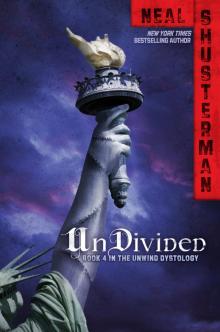 UnDivided
UnDivided UnBound
UnBound The Shadow Club Rising
The Shadow Club Rising Scorpion Shards
Scorpion Shards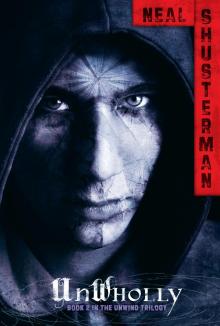 UnWholly
UnWholly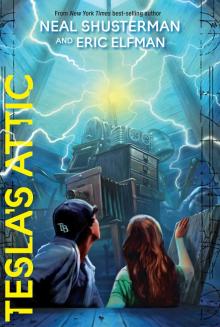 Tesla's Attic
Tesla's Attic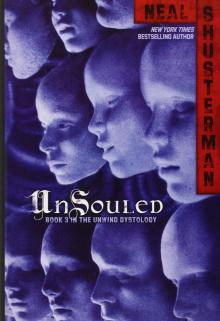 UnSouled
UnSouled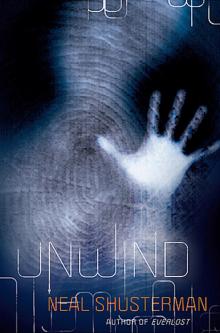 Unwind
Unwind Violent Ends
Violent Ends The Eyes of Kid Midas
The Eyes of Kid Midas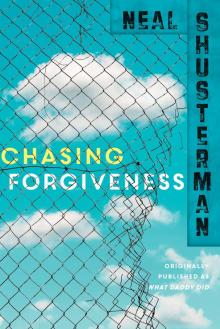 Chasing Forgiveness
Chasing Forgiveness Everfound
Everfound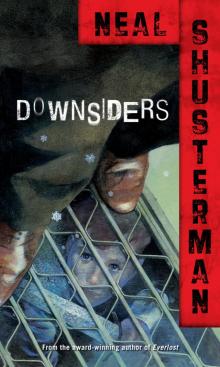 Downsiders
Downsiders The Schwa Was Here
The Schwa Was Here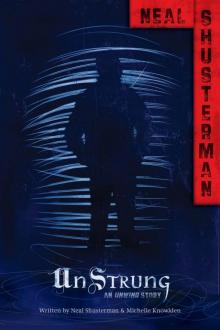 UnStrung
UnStrung Edison's Alley
Edison's Alley Duckling Ugly
Duckling Ugly Everlost
Everlost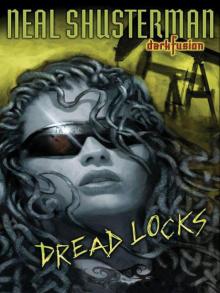 Dread Locks
Dread Locks Antsy Floats
Antsy Floats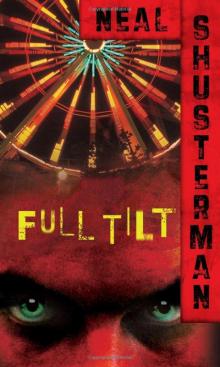 Full Tilt
Full Tilt Thunderhead
Thunderhead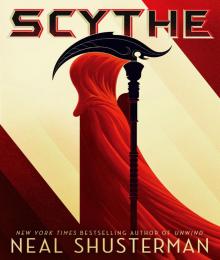 Scythe
Scythe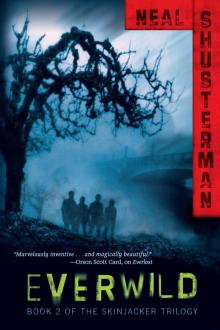 Everwild
Everwild Challenger Deep
Challenger Deep Shattered Sky
Shattered Sky Red Rider's Hood
Red Rider's Hood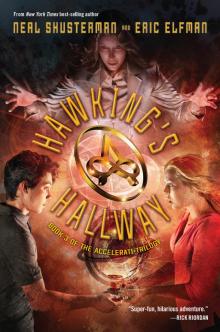 Hawking's Hallway
Hawking's Hallway Antsy Does Time
Antsy Does Time Darkness Creeping: Twenty Twisted Tales
Darkness Creeping: Twenty Twisted Tales Bruiser
Bruiser Thief of Souls
Thief of Souls The Toll
The Toll Darkness Creeping
Darkness Creeping Resurrection Bay
Resurrection Bay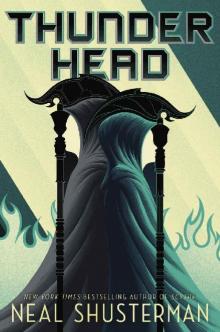 Thunderhead (Arc of a Scythe Book 2)
Thunderhead (Arc of a Scythe Book 2)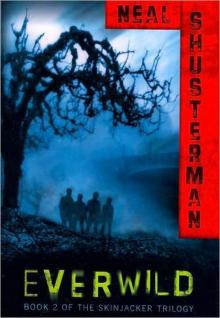 Everwild (The Skinjacker Trilogy)
Everwild (The Skinjacker Trilogy)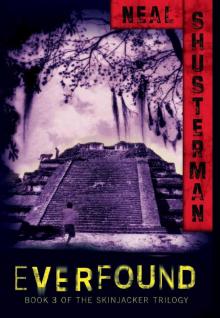 Everfound s-3
Everfound s-3 Edison’s Alley
Edison’s Alley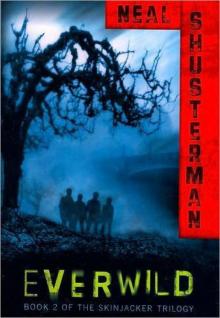 Everwild s-2
Everwild s-2 Dry
Dry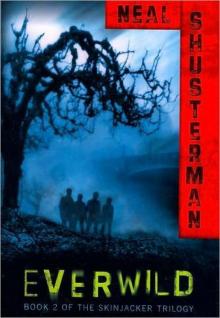 Skinjacker 02 Everwild
Skinjacker 02 Everwild Everlost s-1
Everlost s-1